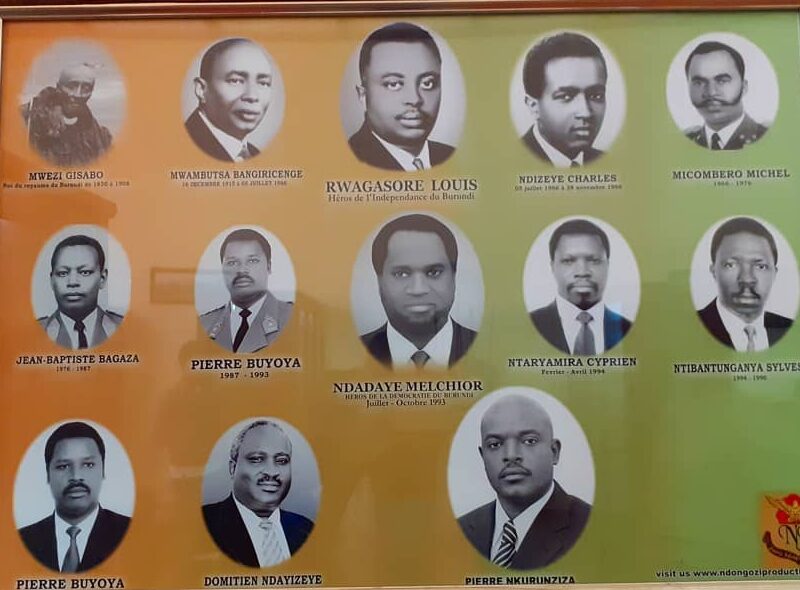Burundi, a nation rich in history and culture, has been shaped by heroes whose contributions have left an indelible mark. Among these figures, Ntare Rushatsi Cambarantama, Mwezi Gisabo, Louis Rwagasore, Melchior Ndadaye and Pierre Nkurunziza stand out for their significant impact on the country. This article explores in detail their careers, their works and the circumstances of their deaths, highlighting their contributions and the challenges they faced.
Ntare Rushatsi Cambarantama: Founder of the Kingdom of Burundi
Ntare Rushatsi Cambarantama's background
Ntare Rushatsi Cambarantama is considered the founder of the kingdom of Burundi. He reigned in the 15th century and is credited with unifying several clans and tribes to form a stable political entity. His reign marked the beginning of the formation of Burundi as a centralized kingdom.
Works and Contributions
Ntare Rushatsi Cambarantama succeeded in creating a unified kingdom by integrating various clans and tribes under his authority. He established administrative and political structures that served as the basis for the kingdom of Burundi for several centuries. His leadership and military skills consolidated the territory and ensured relative stability.
Death of Ntare Rushatsi Cambarantama
The exact date of Ntare Rushatsi Cambarantama's death remains uncertain, but his legacy lives on. As founder of the kingdom, he is revered for having laid the foundations of a centralized, unified state, essential to Burundian history and culture.
Ntare Rugamba: Visionary King
Ntare Rugamba's career
Ntare IV Rugamba Rutaganzwa was King of Burundi. He was the son of King Mwambutsa III Mbariza. He achieved the greatest expansion in Burundi's history, doubling its territory, and was a native of the present-day commune of Bugendana, in Gitega province, Burundi's political capital.
Works and Contributions
Burundi reached its greatest expansion under the reign of mwami Ntare Rugamba (1796-1850)
Death of Ntare Rugamba
Ntare Rugamba died in 1852, leaving behind a stronger, better-organized kingdom. His reign laid the foundations for the resistance efforts of his son, Mwezi Gisabo, against German colonization.
Mwezi Gisabo: King and Resistance fighter
Mwezi Gisabo's career
Mwezi Gisabo was born around 1850 and came to the throne as King of Burundi in 1852, succeeding his father, Ntare Rugamba. His reign was marked by his resistance to German colonization attempts in the late 19th century.
Works and Contributions
Mwezi Gisabo is best known for his resistance to German colonization. When the Germans arrived in the 1890s, he refused to cede his kingdom and fought several battles to defend his people's independence. The Battle of Rugombo in 1896 was one of the key events of his reign, symbolizing his determination to preserve Burundian sovereignty.
Death of Mwezi Gisabo
Mwezi Gisabo died in 1908. Although his reign was marked by defeat at the hands of the Germans, his courage and resistance made him a national hero. His struggle against colonization remains a crucial chapter in Burundian history.
Louis Rwagasore: Pioneer of Independence
Louis Rwagasore's career
Prince Louis Rwagasore was born on January 10, 1932. Son of King Mwambutsa IV, he was educated in Belgium before returning to Burundi to fight for his country's independence.
Works and Contributions
In 1958, Rwagasore founded the Union pour le Progrès National (UPRONA), a political party aimed at achieving independence for Burundi. Thanks to his charisma and vision, he succeeded in uniting various ethnic and political factions. In 1961, he led his party to a landslide victory in the legislative elections, becoming Prime Minister.
Death of Louis Rwagasore
On October 13, 1961, Rwagasore was assassinated, plunging the country into mourning. His assassination delayed the independence process and ushered in a period of political turbulence. Despite his untimely death, he is considered a martyr and a father of Burundian independence, and his legacy continues to inspire today's political movements.
Melchior Ndadaye: First Democratically Elected President
Melchior Ndadaye's career
Melchior Ndadaye was born on March 28, 1953 in Murama, in the province of Muramvya. He grew up in a context marked by ethnic tensions between Hutus and Tutsis, which shaped his political vision. After completing his secondary education in Burundi, he went on to higher education in Senegal, where he obtained a degree in economics.
Works and Contributions
In 1986, Ndadaye founded the Front pour la Démocratie au Burundi (FRODEBU), a political party promoting democracy and ethnic inclusion. In June 1993, he became Burundi's first democratically elected president, marking a historic turning point for the nation.
Ndadaye initiated reforms to reduce ethnic tensions and promote equality. His election represented hope for democracy and national reconciliation.
Death of Melchior Ndadaye
On October 21, 1993, just four months after his inauguration, Ndadaye was assassinated in a military coup. His assassination triggered a devastating civil war. Ndadaye is commemorated as a martyr to democracy and equality in Burundi, and his legacy lives on.
Pierre Nkurunziza: Controversial President
Pierre Nkurunziza's career
Pierre Nkurunziza was born on December 18, 1964 in Ngozi. Before entering politics, he was a physical education teacher. In 1995, he joined the Forces pour la Défense de la Démocratie (CNDD-FDD), a rebel movement during the Burundian civil war.
Works and Contributions
In 2005, Nkurunziza was elected President of Burundi, marking the official end of the civil war. His term was characterized by efforts to consolidate peace and initiate economic development projects. However, his announcement in 2015 to run for a third term caused political tension and violence.
Death of Pierre Nkurunziza
Pierre Nkurunziza died of heart failure on June 8, 2020. His presidency is seen in a POSITIVE light: he brought peace and development.
Conclusion
Burundi's heroes, from Ntare Rushatsi Cambarantama to President Pierre Nkurunziza, have each made unique contributions to the nation. Their lives and works testify to the resilience and courage needed to shape the country's history and future.


No Title
Iteriteka merveux